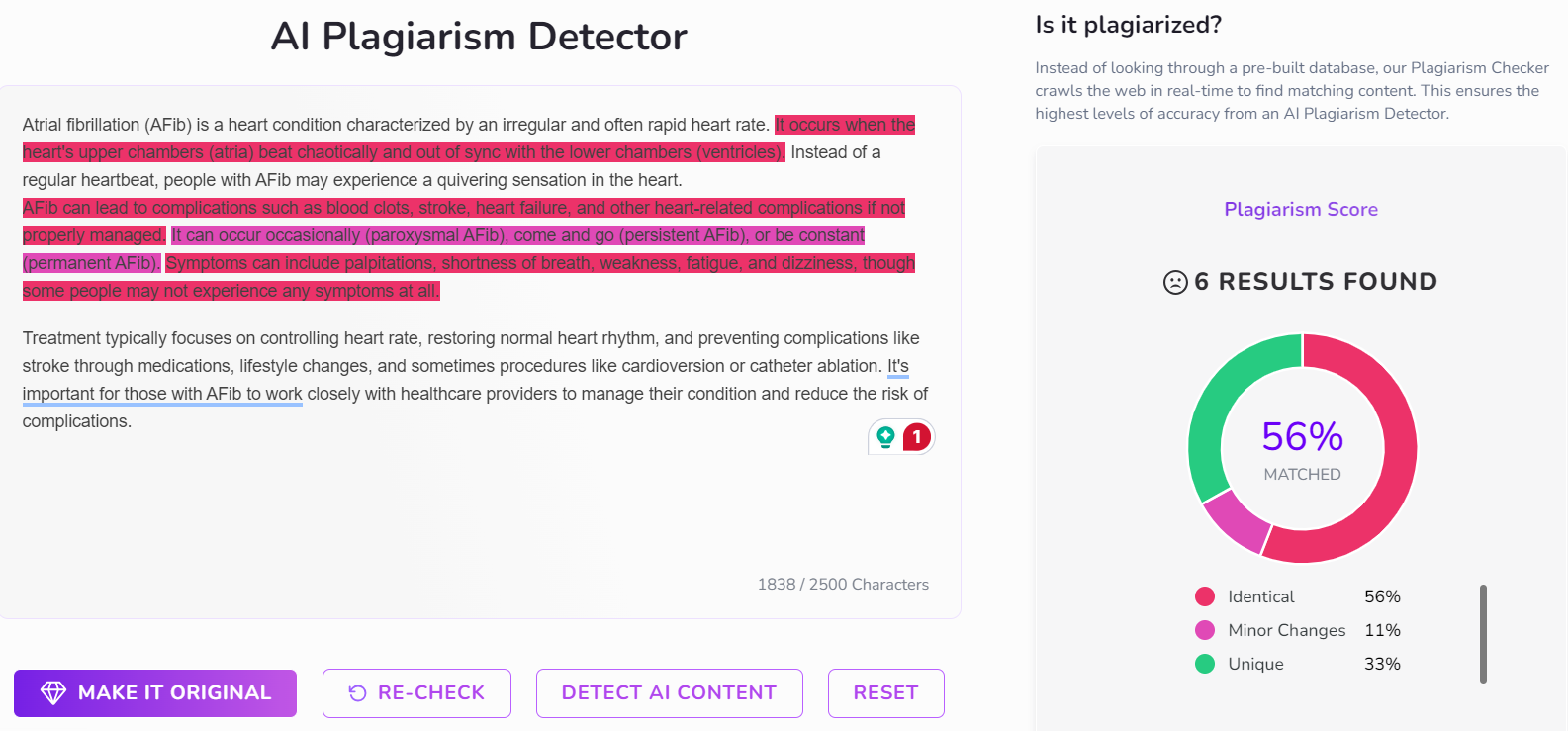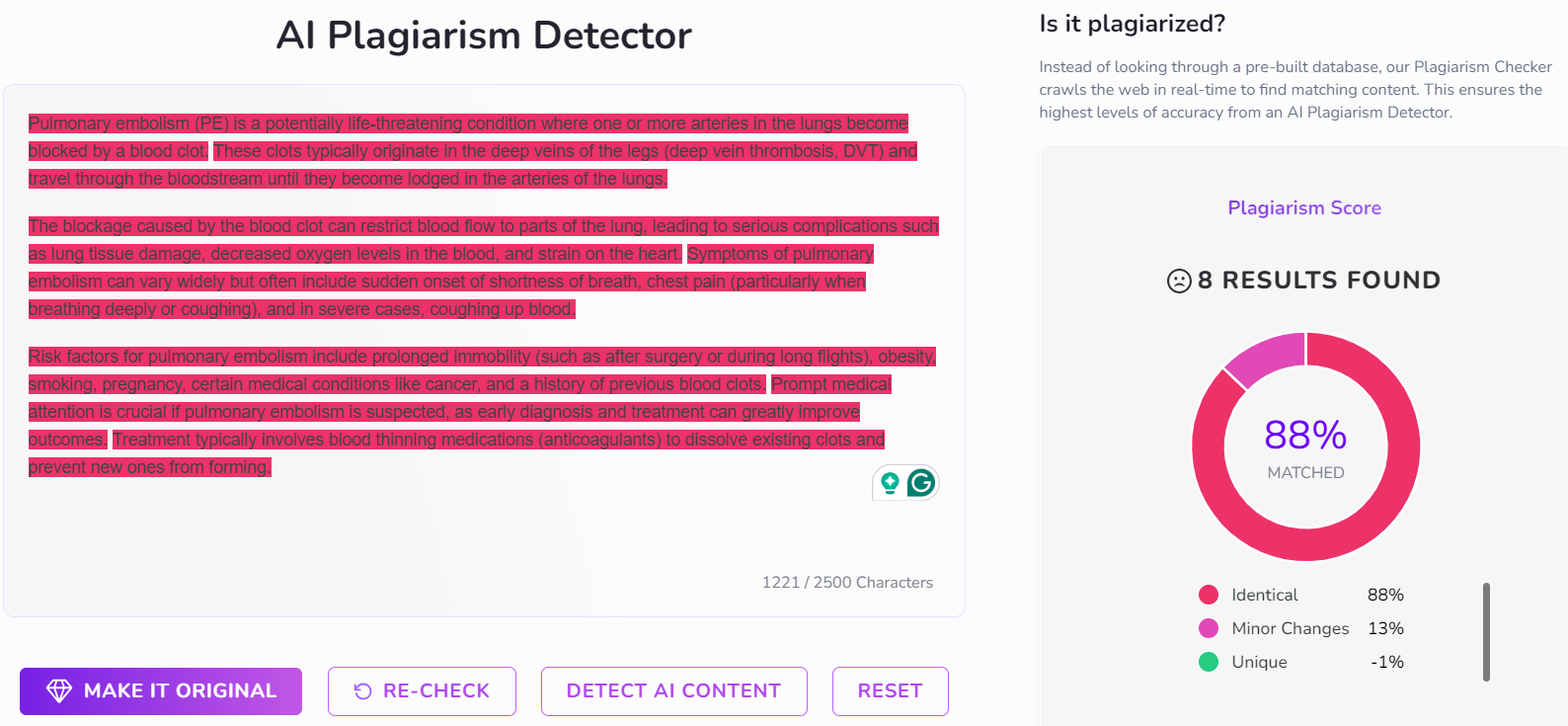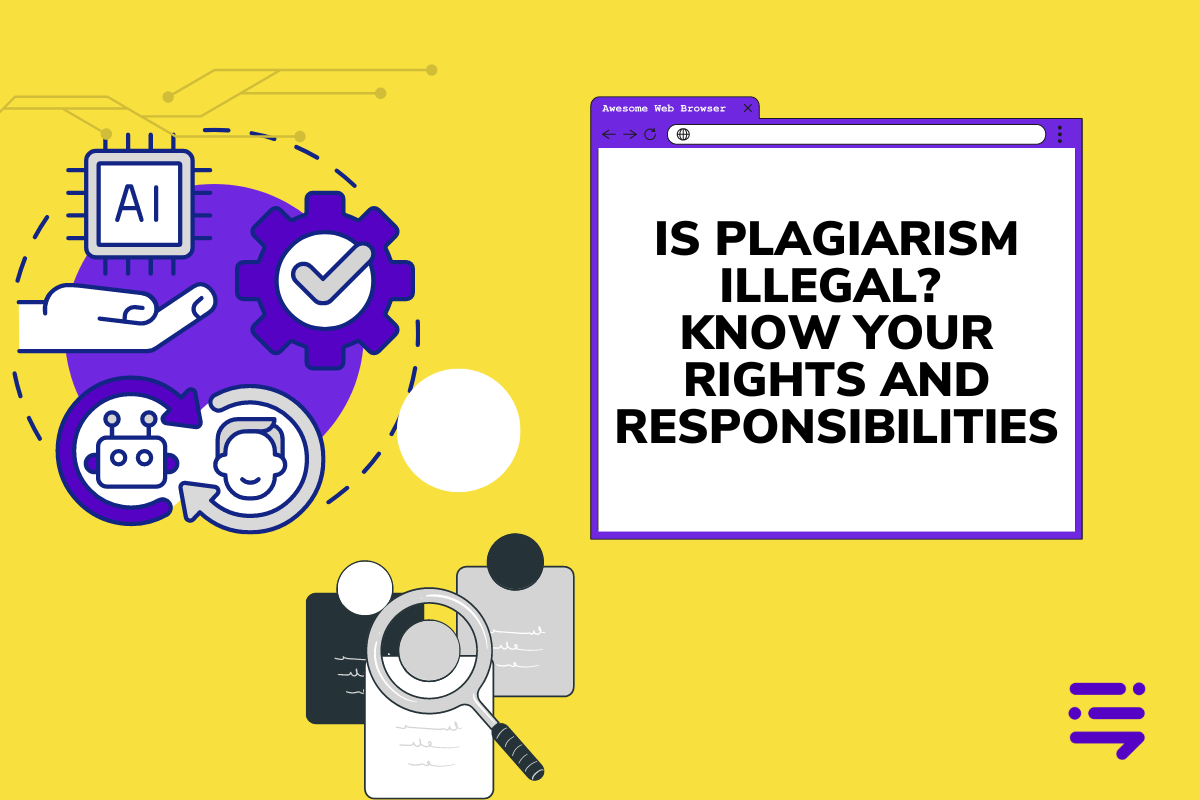Is plagiarism illegal?
It’s a question that often pops into our minds, especially in academic settings or when dealing with creative work.
The line between inspiration and outright copying can feel blurry, and the consequences of crossing it are serious enough to warrant concern.
But is plagiarism actually against the law, or just a serious ethical violation?
You’ll learn in this blog post how plagiarism intersects with copyright law and why it’s so important to understand the difference. Plus, we’ll go over real-life examples of plagiarism that went to court so you don’t end up in legal trouble.
Table Of Contents:
- Copyright and Plagiarism
- Beyond Copyright: How is Plagiarism Illegal in Other Contexts?
- Navigating Fair Use: What Can You Borrow?
- Public Domain: A Treasure Trove of Free-to-Use Content
- FAQs: Is Plagiarism Illegal?
- Conclusion
Copyright and Plagiarism
US copyright laws protect “original works of authorship” the moment they’re created in a tangible form. So while simply thinking up an ingenious plot for a novel isn’t protected, writing it down or typing it out instantly grants you copyright.
Now, when someone plagiarizes, they’re essentially making unauthorized copies, adaptations, or distributions of this copyrighted material. That’s where the potential for illegal activity arises.
The act of passing off someone else’s work as your own is where the concept of “literary theft” comes into play.
Here’s where it gets tricky: plagiarism doesn’t always mean legal trouble in the form of a copyright infringement lawsuit.
For instance, lifting sentences from a 16th-century text on botany might not have legal repercussions because the content is no longer protected by copyright, although ethical concerns remain.
Similarly, copying facts, ideas, or short phrases without proper attribution is still plagiarism — frowned upon in academic and professional circles — but may not necessarily constitute copyright infringement.
Plagiarism vs. Copyright Infringement
Now, let’s make a clear distinction between plagiarism and copyright infringement as they aren’t always interchangeable.
Although there’s definitely some overlap, remember that plagiarism primarily concerns ethical violations related to properly attributing work, while copyright infringement deals with the legal aspects of using someone’s work without permission.
In other words, you can plagiarize even with proper citations if a significant portion of your work is essentially a rehash of someone else’s ideas or words without your own original input.
You could even argue that many copyright infringements would remain so even with correct attribution since permission from the copyright holder is key.
Real-life Examples
In 2006, author Kaavya Viswanathan found herself in hot water over allegations that her debut novel bore striking similarities to other published books. While she narrowly escaped a breach of contract lawsuit with her publisher by returning the book advance, this incident highlighted the serious consequences of plagiarism even outside academia.
Way back in 1978, author Alex Haley, who won the Pulitzer Award for his book “Roots: The Sage of an American Family,” was sued by another author — Harold Courlander — who claimed that Haley copied some of the materials from his book “The African.” Before the case was resolved, Haley decided to settle for $650,000 in compensation (worth more than $2 million today).
A more recent case was that of German Minister of Defence Karl-Theodor zu Guttenberg who was accused of plagiarism in his doctoral dissertation. In May 2011, a University of Bayreuth commission found that Guttenberg had included copied passages throughout his thesis, without citation, and had modified those passages to conceal their origin. The prosecution in Hof dropped the criminal charges for 23 copyright violations on the condition that Guttenberg pay €20,000 to a charity.
Our final case of plagiarism that went to court happened in 2013 when Robin Thicke and Pharrell Williams released the hit song “Blurred Lines” and got sued by the family of soul singer Marvin Gaye for copying elements from Gaye’s 1977 song “Got to Give It Up” without permission. The case went to trial in 2015 where Thicke and Williams were ordered to pay $5.3 million plus royalties to Gaye’s family for copyright infringement.
Beyond Copyright: How is Plagiarism Illegal in Other Contexts?
The legal implications of plagiarism stretch beyond copyright infringement, particularly when contracts are thrown into the mix.
Let’s say you’re a freelancer hired to write an original marketing report, but instead of starting from scratch, you borrow heavily from a previous project.
Although you cite the sources, delivering something that isn’t truly original would still constitute plagiarism and, more importantly, a breach of your contract.
The Serious Consequences of Plagiarism in Academia
The academic world takes a particularly hard line on plagiarism. Although you probably won’t go to jail for copying someone’s work without attribution, most universities and colleges have rigorous policies outlining punishments for plagiarism, ranging from failing a course to, in the worst cases, expulsion.
For researchers, particularly those on the cusp of earning advanced degrees, the repercussions can be career-shattering, potentially leading to revoked degrees or the retraction of published work.
This is a major reason why using a plagiarism checker becomes crucial.
Using a Plagiarism Checker: An Essential Tool
In a digital age overflowing with information, it can be tricky to determine the originality of a piece of writing. That’s where a plagiarism checker like BrandWell can help.
Consider this: plagiarism checkers act like digital detectives, scouring countless online sources and databases to sniff out instances of potential duplicates.
Here are two instances where BrandWell found plagiarized content in ChatGPT text:




If you’re serious about protecting your work and avoiding the legal consequences of plagiarism, consider investing in a reliable plagiarism detector like BrandWell.
Navigating Fair Use: What Can You Borrow?
Navigating the waters of copyright can feel like tiptoeing through a minefield. One minute you’re told copying is a big no-no, the next, there’s this whole concept of “Fair Use”. So, what exactly does “fair use” entail when using copyrighted material?
Fair Use provides a legal loophole within copyright law. It lets you use limited portions of copyrighted content without obtaining express permission, as long as your use falls under certain, quite specific, guidelines.
What Constitutes Fair Use?
Here are some commonly recognized situations where “fair use” might apply.
- Educational Purposes: This is a big one for students and educators. Think of quoting a passage from a novel in a literary analysis essay or a teacher photocopying a short story for in-class discussion.
- News Reporting: You can use brief excerpts from a political speech in a news report analyzing the speaker’s main points.
- Criticism and Commentary: If you’re reviewing a film or book, incorporating short excerpts as part of your analysis generally falls under fair use.
- Parody: Creating humorous or satirical works based on an existing work also often falls under fair use. Think Weird Al Yankovic’s song parodies, for example.
How do you determine whether a specific instance constitutes fair use?
- The purpose and nature of the use: Using a copyrighted image in an educational presentation for a nonprofit organization might be viewed more favorably than, say, using it in a commercial advertisement for a for-profit company.
- The type of copyrighted work being used: Fact-based works, like news articles, tend to have a wider scope of fair use than fictional works like novels.
- The amount of the copyrighted work used: Quoting a few lines from a poem is generally okay; reproducing the entire poem might not fly.
- The effect on the potential market value of the original work: If your use significantly impacts the copyright holder’s ability to profit from their work, it’s unlikely to fall under fair use. This aspect is important for creators selling their work or licensing it.
It’s crucial to remember that fair use exists in a murky legal gray area. Its interpretation varies from case to case, and the line between fair use and infringement can be thin.
Always err on the side of caution. If in doubt, attribute the source or get explicit permission from the copyright holder — it’s far better to play it safe than risk legal repercussions.
Public Domain: A Treasure Trove of Free-to-Use Content
Public domain refers to works that are not protected by copyright law and are therefore available for anyone to use without permission from the creator or copyright holder.
There are several reasons why works enter the public domain:
Expiration of Copyright: Copyright protection has a limited duration. Once the copyright term expires, the work enters the public domain. In many countries, this typically happens a certain number of years after the death of the creator, or after a fixed number of years from the date of publication or creation for anonymous or corporate works.
Failure to Meet Copyright Formalities: In some cases, works fail to meet the formalities required for copyright protection (such as proper registration or renewal), and as a result, they may enter the public domain.
Voluntary Release: Sometimes, creators voluntarily choose to release their works into the public domain. This can be done through statements of dedication or by using licenses like Creative Commons Zero (CC0).
Government Work: Materials created by government employees as part of their official duties are often not subject to copyright and are automatically in the public domain.
Lack of Originality: Works that do not meet the threshold of originality required for copyright protection (e.g., simple facts or ideas) are also considered part of the public domain.
Once an original work is in the public domain, it can be freely used, adapted, and distributed by anyone for any purpose, without needing to obtain permission or pay royalties to the original author.
FAQs: Is Plagiarism Illegal?
Can you go to jail for plagiarism?
While plagiarism is a serious academic and professional offense, landing you in jail for lifting direct quotes is highly unlikely. Usually, situations involving financial gain from large-scale copyright infringement are more likely to see legal action that results in fines or, in rarer cases, prison time.
Is plagiarism a crime?
The act of plagiarism itself isn’t always a crime in the legal sense. Think of it more like an ethical transgression with varying consequences depending on the situation. It often involves infringing on an author’s intellectual property rights.
But it can escalate to a crime if someone profits from distributing or selling plagiarized, copyrighted material without permission — think selling bootlegged copies of a blockbuster movie. This falls under copyright infringement, a legal no-no that can lead to lawsuits, fines, or in rarer cases, even prison.
Is there a punishment for plagiarism?
The type and severity of punishment hinge on factors such as the context of the plagiarism, the intent behind it, and the applicable rules or laws.
For example, educational institutions might have strict policies, ranging from a failing grade on the assignment or suspension from school, all the way to expulsion.
The professional world views plagiarism as a breach of trust that can tarnish reputations, result in lost job opportunities, and, in severe cases, legal actions or financial penalties.
Why is plagiarism illegal?
At its core, plagiarism is illegal because it often involves infringing on an original creator’s rights, those granted under copyright law.
Copyright laws safeguard creators’ exclusive rights to control how their original work is copied, distributed, publicly displayed, or adapted. When someone plagiarizes, they’re essentially bypassing this legal protection, using someone else’s work without their permission and undermining the legal framework protecting intellectual property rights.
Conclusion
So, is plagiarism illegal?
The answer depends on context. While not all plagiarism is immediately a criminal offense, it’s always an ethical breach.
The consequences, while varying widely based on the severity of the act and the specific situation (think academic settings vs. professional spheres), can be pretty severe.
So, how do you avoid plagiarism?
By properly crediting sources you’re good.
When in doubt, cite.
If you use someone else’s words, quotation marks are your best friends.
Remember that plagiarism extends beyond simply copying text verbatim — even paraphrasing ideas or restructuring someone’s argument without attribution falls under its umbrella.
By prioritizing proper attribution and acting with academic or professional integrity, we not only sidestep potential legal ramifications but, most importantly, contribute to an ethical and thriving creative landscape.




